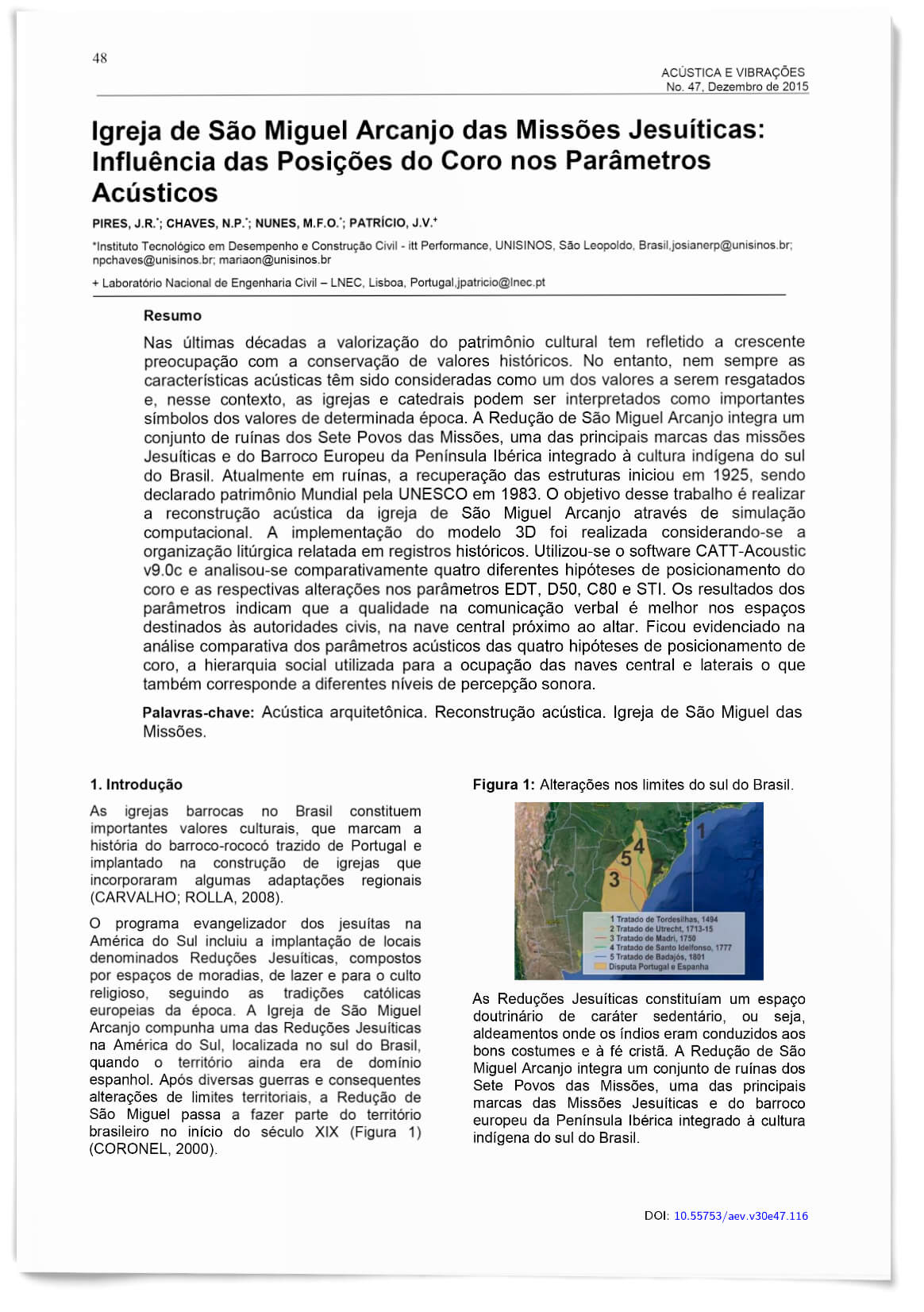Church of São Miguel Arcanjo das Missões Jesuíticas: Influence of the Choir Positions on the Acoustic Parameters
DOI:
https://doi.org/10.55753/aev.v30e47.116Keywords:
architectural acoustics, acoustic reconstruction, Church of São Miguel das MissõesAbstract
In recent decades, the appreciation of cultural heritage has reflected the growing concern with the conservation of historical values. However, acoustic characteristics have not always been considered as one of the values to be rescued and, in this context, churches and cathedrals can be interpreted as important symbols of the values of a given time. The São Miguel Arcanjo Reduction integrates a set of ruins of the Sete Povos das Missões, one of the main marks of the Jesuit and European Baroque missions of the Iberian Peninsula integrated into the indigenous culture of southern Brazil. Currently in ruins, the recovery of the structures began in 1925, being declared a World Heritage Site by UNESCO in 1983. The objective of this work is to carry out the acoustic reconstruction of the church of São Miguel Arcanjo through computer simulation. The implementation of the 3D model was carried out considering the liturgical organization reported in historical records. The software CATT-Acoustic v9.0c was used and four different choir positioning hypotheses and the respective changes in the parameters EDT, D50, C80 and STI were comparatively analyzed. The results of the parameters indicate that the quality of verbal communication is better in spaces destined for civil authorities, in the central nave close to the altar. It was evident in the comparative analysis of the acoustic parameters of the four choir positioning hypotheses, the social hierarchy used for the occupation of the central and lateral aisles, which also corresponds to different levels of sound perception.
References
ÁLVAREZ-MORALES, L. et al. A methodology for the study of the acoustic environment of Catholic cathedrals: Application to the Cathedral of Malaga. Building and Environment, v. 72, p. 102–115, 2014. doi: 10.1016/j.buildenv.2013.10.015 DOI: https://doi.org/10.1016/j.buildenv.2013.10.015
BARRON, M. Auditorium acoustics and architectural design. New York: Spon Press, 2010. DOI: https://doi.org/10.4324/9780203874226
CARVALHO, M.; ROLLA, S. Acústica de igrejas barrocas, arquitetura que faz a diferença. Proceedings. Anais... Buenos Aires: Federação Iberoamericana de Acústica - FIA, 2008.
CIRILLO, E.; MARTELLOTTE, F. Acoustics and Architecture in Italian Catholic Churches. Proceedings. Anais... Seville: International Commission for Acoustics, 2007. DOI: https://doi.org/10.1260/135101007781998938
CORONEL, L. O Legado das Missões. São Miguel das Missões: Prefeitura de São Miguel das Missões, 2000.
COSTA, L. Arquitetura dos Jesuítas no Brasil. Revista do Serviço do Patrimônio Histórico e Artístico Nacional, n. 5, p. 105–169, 1941.
HENRIQUE, L. L. Acústica musical. Lisboa: Fundação Calouste Gulbenkian, 2007.
MACHADO, J. R. Povoado missioneiro: cenografia do Barroco a igreja o teatro e a vida. 2007. PUC RS, 2007.
MEIRA, A. L. G. O patrimônio histórico e artístico nacional no Rio Grande do Sul no século XX: atribuição de valores e critérios de intervenção. 2008. 483 f. UFRGS, 2008.
PATRÍCIO, J. V. Acústica nos edifícios. Lisboa: Verlag Dashöfer, 2010.
RODRIGUES, P. N. Caracterização dasargamassas históricas da ruína de São Miguel Arcanjo/RS. 2013. 142 f. UFSM, 2013.
VORLÄNDER, M. Auralization: Fundamentals of Acoustics, Modelling, Simulation, Algorithms and Acoustic Virtual Reality.Berlin: Springer-Verlag, 2008. doi: 10.1121/1.2908264 DOI: https://doi.org/10.1121/1.2908264

Published
How to Cite
Issue
Section
License
Copyright (c) 2015 Acústica e Vibrações

This work is licensed under a Creative Commons Attribution-NonCommercial-ShareAlike 4.0 International License.




